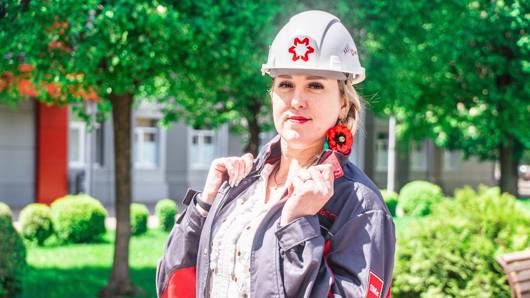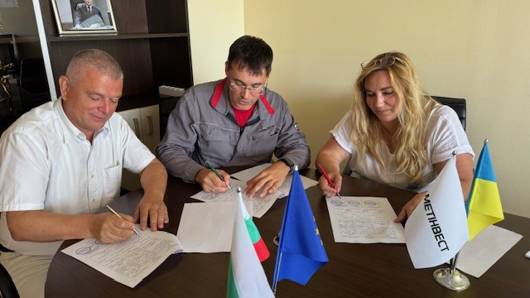In an interview with UAprom, Oleksandr Povazhnyi, rector of the private mining and metallurgical university Metinvest Polytechnic, discusses the university’s adaptation to new conditions, the adjustment of educational programmes to meet contemporary demands, the training of multi-skilled specialists for the country’s reconstruction, and grant programmes for students and postgraduates to advance science and business.
− Can you describe how Metinvest Polytechnic operates in the third year of Russia’s full-scale invasion of Ukraine?
− Indeed, we have all had to adapt to new conditions. Due to the war, we have temporarily lost access to Mariupol, where the construction of a modern university campus was underway at that time. Despite this, Metinvest Polytechnic has not stopped working a single day. We have also managed to retain almost the entire faculty. Today, the university employs 127 lecturers, including 33 professors and 84 associate professors. This is a rather strong team considering the young age of our university and all the difficulties we have faced in recent years.
It is very important that Metinvest Group, as our founder, had no doubts about the necessity of the university’s existence. The year 2022 was very difficult for both us and the Group, but we enrolled our first students in the university’s history. And this year, for the first time, we will start admitting students to our postgraduate programme. So now we offer all levels of higher education: bachelor’s, master’s and doctoral programmes.
Currently, we are working in a hybrid format. We have not abandoned face-to-face classes because we understand that it is impossible to train an engineer without laboratory work, practical classes and experiments that need to be conducted at industrial facilities.
At the same time, since the university’s inception, we have paid a lot of attention to digitalisation processes. We now actively use numerous digital solutions that significantly streamline the educational process and communication with students. We use a special platform that allows our students and lecturers to access educational materials at any time, and upload completed assignments and assessment forms. The university also provides lecturers and students with access to electronic libraries, such as Cortex, collaborates with giants in the field of automation like Siemens, and acquires new licences for software applications that enable us to continuously improve the educational process.
− How is student enrolment going now? Who are you targeting and how do you attract applicants?
− We have two areas of focus: first, within the business; and second, externally. We are conducting active information campaigns to attract new students. Another important aspect has been word-of-mouth from our current students and graduates, who recommend Metinvest Polytechnic to their acquaintances, sharing our values and advantages. We plan to work more actively with businesses, not only with Metinvest Group but also with other companies, to form groups on request. We are creating a new management structure to strengthen the commercial part of our university’s activities.
Currently, we have over 400 students in bachelor’s and master’s programmes and more than 200 people in professional development programmes. In total, more than 3,900 students have completed long-term and short-term programmes since the university started operating.
To better understand our students’ needs, we have also decided to create an alumni association. While we have only had one graduating class so far, we want to maintain momentum and keep developing. Through the association, we will receive feedback on whether the university’s development trajectory meets student expectations and if adjustments are needed.
− What do you focus on when designing educational programmes? Have you introduced new areas of training in response to the events in the country?
− Currently, Metinvest Polytechnic trains specialists in 16 bachelor’s programmes and 18 master’s programmes. The core areas are metallurgy, mining, automation and computerisation, as well as ecology and occupational safety. We have created 14 professional development courses that include theoretical and practical components, culminating in the submission of final projects. This is a very important stage. It gives course participants the opportunity to grow and helps us to understand their potential as candidates for employment in specific positions.
This year, we also developed a new programme aimed at preparing a reserve for the top management of Metinvest. It involves small groups of 3-4 people. The programme focuses on issues related to economics, digitalisation and occupational safety.
Another important part of our activities is occupational safety training, which is more relevant than ever now. This issue is always in the focus of Metinvest’s management, so the university is constantly involved in this programme. This includes assessing risks when working at heights, with lifting, moving, and rotating machines and mechanisms, and more.
Each of these areas – academic training and short-term courses – is highly important. At the same time, we recognise that we are not building a corporate training centre but a full-fledged university with space for science. We also support and encourage student initiatives and offer scholarship and grant programmes.
− Can you tell us more about them?
− Our philosophy is quite simple. We evaluate our students’ work in three areas. First, education. Second, science and participation in areas such as Metinvest’s operational improvement programmes. And third, participation in student initiatives, student government bodies and volunteer programmes. There are certain priorities depending on the year of study. For example, education is a priority for first- and second-year students, while science and participation in operational improvement programmes become more important in the third and fourth years.
Currently, about 30 students receive scholarships, including merit-based ones. There are three types of scholarships in total: academic, merit-based academic, and the Metinvest CEO’s scholarship. The scholarship should be an incentive and reflect the student’s achievements in education or science.
In autumn, a grant programme will be launched at Metinvest Polytechnic, providing funding to individual students or groups of students for scientific research. Specific research areas will be determined by the grantors. The main focus will be on research necessary to improve business operations.
We recently reformed the university’s management system and introduced academic councils. There are currently seven councils, each headed by two people: the rector from the university’s side and a director or department head from the business side, such as in metallurgy, ecology, mining or automation. Within these academic councils, hearings will be held to determine the priority areas for grant funding. Thus, the business customer will be involved in making these decisions.
− We understand that Ukraine’s future is in reconstruction, and the future of the mining and metallurgical complex is in green metallurgy. What strategic goals does your university have in this context?
− This is a very important question. First, we do not treat our curricula and programmes as axioms or dogmas. We understand that the external environment is constantly changing. This applies to sectoral approaches, such as the development of green metallurgy. We regularly review and adjust the content of our educational programmes. Second, we are launching new educational programmes. Recently, we introduced a new course in “Modernisation Management in Metallurgy”. We all believe and know that the war will end, and after that, there will be a need to rebuild Ukraine based on new principles, which we are incorporating into our course and programme development.
− How do you respond to the rapid adoption of artificial intelligence technology? How are you changing programmes, and are you using AI in the university’s operations?
− We are following this path. We see interest in this technology from both the educational and business communities, and are working to embed AI into our curricula and research plans.
Overall, we try to make all our educational programmes modern and future-focused. When we talk about metallurgy, we certainly include current trends, which involve not only studying new technologies but also addressing environmental issues. We regularly introduce new programmes, such as business analytics, modernisation management in metallurgy, and value management. We offer students the opportunity to study computer science and enhance their digital skills. We are constantly seeking new areas of study and introducing new disciplines to ensure relevant knowledge and skills. When we talk about training specialists at our university, we recognise that future professionals need to be proficient in many areas: having the necessary technical knowledge, digital competencies, language skills, teambuilding and management ability, effective communication, and more.
− The demographic situation in Ukraine is currently quite challenging, with many people having left the country. Have you felt the impact of migration on the university’s operations? Are you planning to attract Ukrainians who have gone abroad to study?
− While we are considering this issue, we have yet to prepare a strategy to address this issue. However, we are taking initial steps in this direction. We are currently collaborating with universities in Bulgaria and Italy, where Metinvest enterprises are located, and we can already see some positive results. For example, Metinvest Polytechnic recently signed a memorandum of cooperation with a Bulgarian university and Metinvest’s Bulgarian enterprise Promet Steel to train specialists in certain fields. We have also launched a pilot project for international internships for our students.









